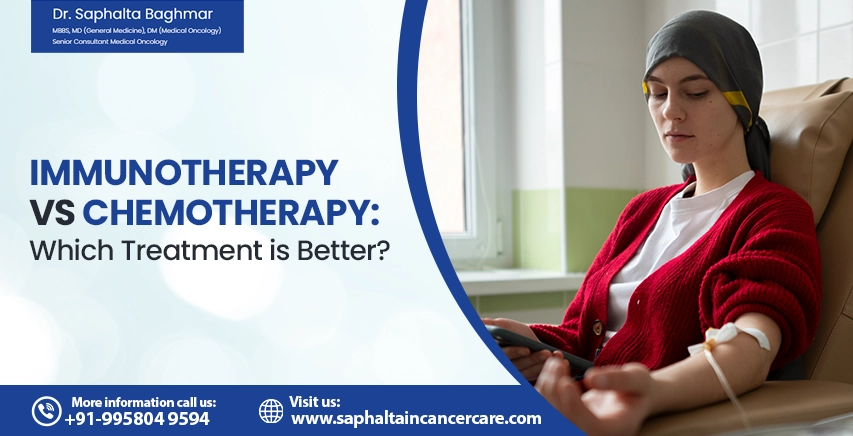Immunotherapy and chemotherapy are among the most prescribed treatments for cancer. Both therapies utilize medications that inhibit the proliferation of cancer cells and work on eliminating the tumor. While chemotherapy is a conventional treatment used for decades now, immunotherapy is a more recent approach that has garnered considerable attention, owing to its effectiveness and reduced adverse effects compared to chemotherapy.
While these treatments are similar in their goals and the use of medications, their approaches vary greatly. So when it comes to immunotherapy vs chemotherapy, several factors must be considered to determine the better treatment among the two. This article discusses and compares the major determining factors in the efficacy and safety of immunotherapy and chemotherapy. Read on to learn the advantages and disadvantages of each treatment.
Uncover the groundbreaking insights on Immunotherapy vs. Chemotherapy in cancer treatment by the best oncologist in Delhi. Dive deeper into the future of battling cancer. Read the article now!
Chemotherapy: Understand the Treatment
Chemotherapy drugs were first invented during the 1940s and were soon adopted as a part of the frontline cancer treatment. Today, there are over 150 drugs used in chemotherapy, prescribed based on the stage and type of cancer along with the patient’s medical history.
Cancer cells divide more rapidly than normal cells. The chemotherapy drugs target this characteristic mechanism and work directly against cancerous cells by attacking fast-growing cells. This leads to an eventual decrease in the number of cancer cells in the body and a lower chance of the cancer returning.
Among the many drugs available, oncologists decide on the right prescription based on the type of cancer, the extent of its spread, and whether the patient has received chemotherapy in the past. Each of these chemotherapy drugs further follow varied mechanisms and have high efficacy against certain types of cancer.
Also Read: What Is The Cost Of Chemotherapy In India
Immunotherapy: Understand the Treatment
Unlike chemotherapy, immunotherapy attacks the cancer cells indirectly. The tumor cells have special properties that allow them to go undetected by the immune system, thus making their elimination difficult. Immunotherapy drugs act by strengthening the patient’s immunity and sensitizing it to cancer cells. This allows the immune system to identify cancer cells as a foreign threat and deploy the necessary mechanisms to eliminate them.
Immunotherapy has been the first remarkable treatment devised since the invention of chemotherapy drugs. This mechanism has been proven effective against several forms of cancer and is compatible with other common cancer treatments.
Like chemotherapy, immunotherapy also encompasses several drugs wherein the drug chosen for the treatment is specific to each patient. These medications can be administered orally, intravenously, or topically.
Also Read: What Is The Cost Of Immunotherapy In India
Immunotherapy vs Chemotherapy: Mechanism of Action
Chemotherapy targets the fast-growing property of tumor cells and kills them, thus shrinking and gradually eliminating the tumor.
Immunotherapy, on the other hand, enables the immune system to act against the tumor. These drugs do so by blocking the immune checkpoints, enhancing the T-cell activity, triggering the formation of monoclonal antibodies with specific activity against tumor cells, acting as vaccines, or enhancing some specific immune mechanisms.
Chemo vs Immunotherapy: Time Taken to Work
With chemotherapy, the results are quick as the method directly targets the tumor cells. Some patients experience an almost-immediate response.
In case of immunotherapy, however, the action of the drugs and the response of the immune system takes some time. Pseudoprogression is a common occurrence during the initial stages of immunotherapy wherein the tumor appears to grow in size after the treatment. This, however, is usually due to the influx of immune cells into the tumor as the drugs show their effect.
Chemo vs Immunotherapy: Effectiveness
Usually, the efficacy of chemotherapy lasts as long as the treatment itself. This is because the drugs directly work against the cancer cells. Therefore, once the treatment stops and the effects of the drugs ebb away, there is a relatively higher risk of the returning of the cancer.
Since immunotherapy works to strengthen the immune system, it has lasting effects that remain long after the treatment has stopped. The human immune system has the “memory” of every foreign threat it fights against and immediately recognizes and acts the threat if it reappears. This applies to cancer as well. Patients who received immunotherapy have been reported to have specific antibodies against cancer cells and the ability to detect and attack them if new cancer cells are formed.
Some studies, however, have observed that some specific doses and types of chemo also strengthens the immunity and contributes to a lasting protection against cancer. Considering this, chemotherapy and immunotherapy can be highly effective and beneficial in the long run if administered together.
Immunotherapy vs Chemotherapy: Target Cancer Types
Considering their modes of action and the variety of drugs available for each treatment, both chemotherapy and immunotherapy are effective against almost all types of cancer. Chemotherapy is a frontline treatment for almost all types of cancer and immunotherapy can trigger immune action against any type of cancer cell with the right drug use.
Studies have found that immunotherapy is also effective against certain cases of cancer that are resistant to the primary treatments including chemotherapy and radiotherapy.
Chemo vs Immunotherapy: Side Effects
Both chemotherapy and immunotherapy have side effects ranging from mild and moderate to severe.
Since chemotherapy targets rapidly-growing cells, some healthy cells with a characteristic fast growth like the blood cells, hair follicles, and the cells along the inner lining of the intestine. Some common chemotherapy side effects include:
- Hair loss
- Nausea
- Fatigue
- Pain (due to the drugs potentially attacking healthy cells)
Immunotherapy does not act against any cell directly. It however may lead to an oversensitive immune system which could cause minor reactions like rashes to severe ones like the immune system attacking specific healthy cells or organs. Some common immunotherapy side effects include:
- Skin issues like itching and rashes
- Digestive issues like nausea and constipation
- Arthritis
- Flu-like symptoms like fever and coughing
- Thyroid issues
The Best Cancer Treatment is Subjective
Chemotherapy and immunotherapy are highly effective treatments with remarkable activity against cancer cells. While chemotherapy works faster than immunotherapy, the latter imparts a relatively longer protection to the patient. Both treatments are accompanied by mild to severe side effects but have a significant role in improving the prognosis of a patient.
When it comes to chemo vs immunotherapy, each treatment has its set of benefits and downsides. They are, however, effective when paired in a treatment plan. However, the best treatment plan for each patient varies based on several factors. One must consult with their oncologist and discuss the potential risks and benefits when devising a treatment plan.


